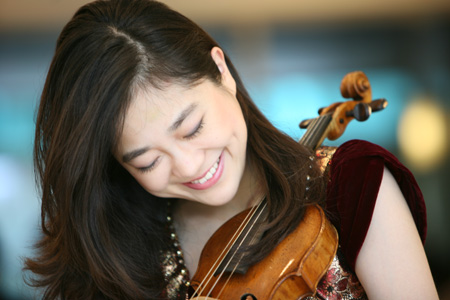- California Assembly OKs highest minimum wage in nation
- S. Korea unveils first graphic cigarette warnings
- US joins with South Korea, Japan in bid to deter North Korea
- LPGA golfer Chun In-gee finally back in action
- S. Korea won’t be top seed in final World Cup qualification round
- US men’s soccer misses 2nd straight Olympics
- US back on track in qualifying with 4-0 win over Guatemala
- High-intensity workout injuries spawn cottage industry
- CDC expands range of Zika mosquitoes into parts of Northeast
- Who knew? ‘The Walking Dead’ is helping families connect
Crossover appeal
Violinist Park Ji-hae looks to blur boundaries with her experiments

Germany-based violinist Park Ji-hae is garnering attention for her experimental, approachable brand of classical music. (Korea Times)
By Jung Min-ho
Violinist Park Ji-hae has already accomplished plenty to be proud of: she is a multiple winner of Germany’s Jugend Musiziert, became a ”golden disk’’ musician with her album “Baroque in Rock” and is a long-time holder of a Petrus Guarnerius, one of the world’s most valuable musical instruments, awarded by the German government after rigorous tests.
Now, the 28-year-old wants to create her own genre, which she imagines as a more approachable form of classical music that aggressively embraces pop-music elements.
“I want to make my music a genre that people can immediately identify, something that never existed,” Park said in an interview.
While Park’s stellar reputation had been built through classical music, she has been increasingly experimenting with pop music over the past several years. She prefers to be called a ”violiner’’ because that sounds more flexible than ”violinist.’’
“I would not want the limitations held by the name of a classical musician,” Park said. “I want many people to enjoy my music much beyond just classical music fans. I think the term, ‘violinist,’ keeps me distant from the audience. I want to communicate with them more,” she said.
Born in Mainz, the hometown of violinist Peter Cornelius and Bernhard Schott, the founder of Schott Music, and raised by a violinist mother, Park was playing the violin from as early as she can remember.
Her talent soon manifested and she was called a prodigy before she fully understood the meaning of the word. When she gained admission to a music conservatory in Mainz after winning a German youth music contest for two straight years from 2002, she was only 14.
As much as she loved playing the violin, she felt the pressure of pursuing perfection was becoming excruciating. She then began thinking about altering her direction as an artist.
“As I grew up, I saw many of my mother’s friends who devoted almost their entire life to music but their influence was very limited,” Park said.
“I want to be a powerful musician that actually can change the world.
“Do you know what musicians have the biggest influence? It’s the pop singers who did not major in music. I want to change that.”
She believes that the classical musicians of today are failing to effectively communicate with the broader public.
“No matter how skilful the musicians are, if the audience cannot understand the music they play, who is it for?” she said. “It is important for them to learn how to keep in tune with the people.”
Park said her attempt to re-wire herself as an artist was a painful process. She experienced depression as she felt she was pressuring herself to deny her own accomplishments as a musician. But she now believes the emotional distress has allowed her to rediscover what music really means to her and understand how her music can affect listeners.
“I don’t know what caused it (the depression). Perhaps it was an enormous pressure that I had to live with everyday,” she said. “A doctor told me that I could drop dead if I wouldn’t eat, walk. But I wasn’t scared.”
She called the period “the dark night of my soul.” Words of comfort from her family and friends couldn’t reach her heart as if they were just empty screams. “When you are in depression, almost magically, nothing motivates you,” she said.
It was music that lifted her out of the long dark night, which started in her late teens when she had few things left to achieve as a violinist.
“On someone’s offer, I started to play for people in hospitals, prisons and churches to console people in need, there, music started healing my soul as much as theirs,” she said.
“Consolation of music is different from the one of words. It starts from the inside … It cries with you instead of telling you to stop crying.”
She said she wants to keep telling people stories, messages of hope. But she believes that tough times aren’t something to be avoided, but to be endured.
She went through some of her own. Now she has more perspectives on life.
The devout Christian recalled her middle school years when she lived far away from her mom. But it also was the time she felt closest to God.
She prayed for her dreams. Some were unrealistic, but they came true. She still prays for God to use her as “the light of the world.”












![일본 사도광산 [서경덕 교수 제공. 재판매 및 DB 금지]](http://www.koreatimesus.com/wp-content/uploads/2024/07/PYH2024072610800050400_P4-copy-120x134.jpg)


